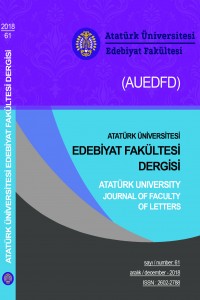Abstract
Bu çalışmada Platon’un ahlaki değerlerin ontolojik ve epistemolojik temeli hakkındaki düşünceleri incelenmektedir. Felsefenin en önemli sorunlarından birisi değer sorunudur. Değer, varoluş alanına ait olduğu için var olmayan şeyin değeri olamaz. Değer, öncelikle bir varlığın tespitine dayanır ve ancak sezgi ile kavranabilir. Değerlerin kişisel duygu ve eğilimlerden bağımsız, ne ise o olduklarını söyleyen Sokrates’e göre değerler, nesnel bir varlığa sahiptirler. Aynı düşünceyi büyük bir kararlılıkla savunan Platon da her türlü değerin, özellikle ahlaki değerlerin bağımsız ve mutlak olarak doğru veya yanlış olduklarını iddia etmektedir. Platon, etik konusunda hocası Sokrates’in eudaimonist etik anlayışının sürdürücüsü olmuştur. Sokrates’te olduğu gibi Platon’da da insan hayatının nihai hedefi mutluluktur. Platon da insanın erdemli bir hayat sürerek mutluluk denen hedefe ulaşabileceğini söylemektedir. Bu nedenle, Sokrates’in etiğinin özünü koruyarak temel eksikliklerini kapatmak gerektiğine inanmıştır.
References
- Akarsu, B. (1982). Ahlak Öğretileri, İstanbul: Remzi Kitabevi. Arslan, A. (2013). Felsefeye Giriş, Ankara: Adres Yayınları. Audi, R. (1999). The Cambridge Dictionary of Philosophy, Cambridge: Cambrid-ge University Press. Price, A. W. (2005). “Plato: Ethics and Politics”, Routledge History of Philo-sophy, vol 1. From the Beginning to Plato (ed. by C. C. W Taylor), New York: Routledge. Reeve, C. D. C. (2006). Philosopher-Kings: The Argument of Plato’s Republic, Cambridge: Hackett Publishing Company. Cevizci, A. (2014). Etik-Ahlak Felsefesi, İstanbul: Say Yayınları. Cevizci, A. (2010). Felsefe Tarihi, İstanbul: Say Yayınları. Delius, H. (1997). ‘Etik’ Günümüzde Felsefe Disiplinleri (Çev. Doğan Özlem). İs-tanbul: İnkılâp Kitabevi. Dummett, M. (1978). Truth and Other Enigmas, Cambridge: Cambridge Univer-sity Press. Eflatun, (1989). Timaios, (Çev. Erol Güney- Lütfi Ay). İstanbul: Milli Eğitim Ba-kanlığı Yayınları. Skirbekk, G-Gilge, N. (2006). Antik Yunan’dan Modern Döneme Felsefe Tarihi (Çev. E. Akbaş-Ş. Mutlu). İstanbul: Kesit Yayınları. Derek, J. (2015). Felsefenin Kısa Tarihi (Çev. Burcu Yalçınkaya). İstanbul: İnkılâp Kitapevi. Kuçuradi, İ. (2013). İnsan ve Değerleri, Ankara: Türkiye Felsefe Kurumu. Paksüt, F. (1982). Platon ve Platon Sonrası, Ankara: Kültür ve Turizm Bakanlığı Yayınları. Platon, (2010). Alkibiades I-II (Çev. Furkan Akderin) İstanbul: Say Yayınları. Platon, (2014). Sokrates’in Savunması (Çev. Furkan Akderin). İstanbul: Say Ya-yınları.
Abstract
In this study, Plato's thoughts on the ontological and epistemological basis of moral values are examined. One of the most important problems of philosophy is the value problem. Since the value belongs to the field of existence, it cannot have value for what does not exist. Value is primarily based on the detection of an asset and can only be grasped by intuition. According to Socrates, who says values are values, independent of the personal feelings and tendencies, values have objective being. Plato, who defends the same idea with great determination, claims that all values, especially moral values, are independent and absolute true or false. Plato has been the sustainer of the eudaimonist ethic of Socrates, his teacher. As in Socrates, the ultimate goal of human life in Plato is happiness. Plato says that man can achieve a goal called happiness by leading a virtuous life. Therefore, he believed that it was necessary to close the fundamental deficiencies of Socrates by preserving the essence of its ethics.
References
- Akarsu, B. (1982). Ahlak Öğretileri, İstanbul: Remzi Kitabevi. Arslan, A. (2013). Felsefeye Giriş, Ankara: Adres Yayınları. Audi, R. (1999). The Cambridge Dictionary of Philosophy, Cambridge: Cambrid-ge University Press. Price, A. W. (2005). “Plato: Ethics and Politics”, Routledge History of Philo-sophy, vol 1. From the Beginning to Plato (ed. by C. C. W Taylor), New York: Routledge. Reeve, C. D. C. (2006). Philosopher-Kings: The Argument of Plato’s Republic, Cambridge: Hackett Publishing Company. Cevizci, A. (2014). Etik-Ahlak Felsefesi, İstanbul: Say Yayınları. Cevizci, A. (2010). Felsefe Tarihi, İstanbul: Say Yayınları. Delius, H. (1997). ‘Etik’ Günümüzde Felsefe Disiplinleri (Çev. Doğan Özlem). İs-tanbul: İnkılâp Kitabevi. Dummett, M. (1978). Truth and Other Enigmas, Cambridge: Cambridge Univer-sity Press. Eflatun, (1989). Timaios, (Çev. Erol Güney- Lütfi Ay). İstanbul: Milli Eğitim Ba-kanlığı Yayınları. Skirbekk, G-Gilge, N. (2006). Antik Yunan’dan Modern Döneme Felsefe Tarihi (Çev. E. Akbaş-Ş. Mutlu). İstanbul: Kesit Yayınları. Derek, J. (2015). Felsefenin Kısa Tarihi (Çev. Burcu Yalçınkaya). İstanbul: İnkılâp Kitapevi. Kuçuradi, İ. (2013). İnsan ve Değerleri, Ankara: Türkiye Felsefe Kurumu. Paksüt, F. (1982). Platon ve Platon Sonrası, Ankara: Kültür ve Turizm Bakanlığı Yayınları. Platon, (2010). Alkibiades I-II (Çev. Furkan Akderin) İstanbul: Say Yayınları. Platon, (2014). Sokrates’in Savunması (Çev. Furkan Akderin). İstanbul: Say Ya-yınları.
Details
| Primary Language | Turkish |
|---|---|
| Subjects | Creative Arts and Writing |
| Journal Section | Articles |
| Authors | |
| Publication Date | December 25, 2018 |
| Submission Date | November 12, 2018 |
| Published in Issue | Year 2018 Issue: 61 |


